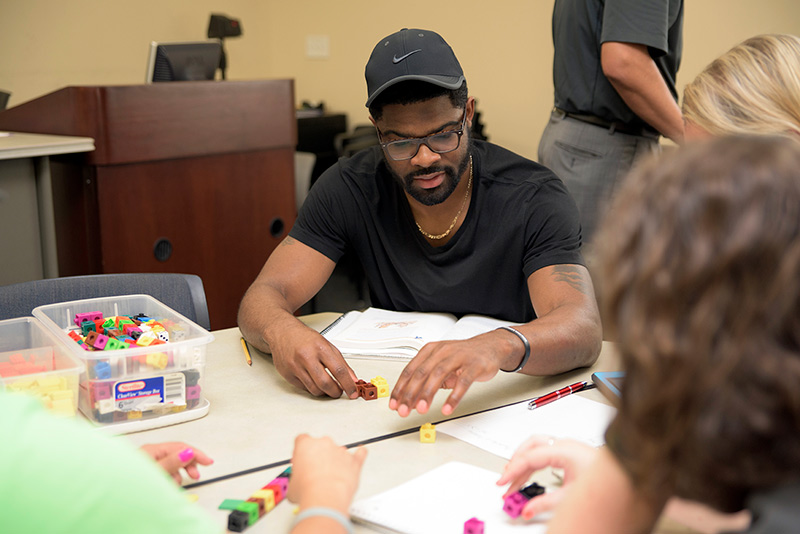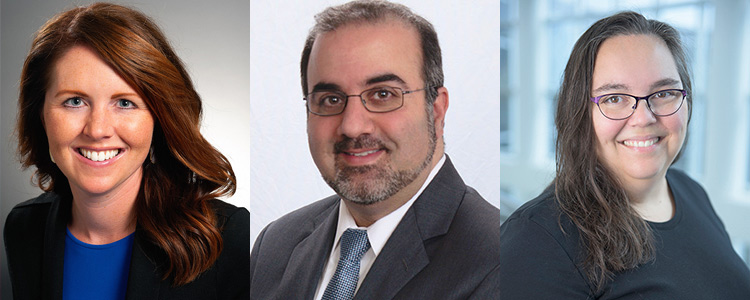A National Science Foundation grant will explore the impact of a professional development framework in preparing prospective secondary mathematics teachers.
By D’Ann Rawlinson and Amy Floyd

Teacher preparation programs are instrumental for long-term improvement in teacher effectiveness and retention. STEM teacher preparation programs are designed to prepare undergraduate and graduate students to become certified teachers in mathematics or science education. The programs consist of STEM-related content courses, teaching methods courses and field-based experiences, including student teaching internships in K-12 schools. Research shows that these components are often taught in isolation, leading to divisions between content knowledge, teaching and learning theories, and classroom practice.
“A lack of coherence between research and practice may explain why some teachers do not use the strategies they learned in their preparation programs in their own classrooms,” says Sarah B. Bush, a UCF associate professor of K-12 STEM education.
A team of researchers from the University of Central Florida, University of Maryland Baltimore County, University of Kentucky and Berea College will study the use of a highly collaborative professional development framework with undergraduate secondary mathematics teacher preparation programs over the next four years. This multi-institution research team will analyze the framework's impact on prospective and new teachers' knowledge and classroom practice and use the findings to guide teacher preparation programs.
The research project is supported by a $3 million grant from the National Science Foundation with UCF’s portion totaling $1 million.
The framework, PrimeD (Professional Development: Research, Implementation and Evaluation), was developed six years ago as part of a national effort to improve mathematics and science education professional development. The creators of the framework, including Bush, the UCF principal investigator of the project, designed PrimeD using well-studied professional development elements that connect to classroom practice.
The overall goal of teacher professional development is to improve student learning by enhancing teachers’ knowledge, skills, attitudes and classroom practice.
“Traditional professional development opportunities, such as short-term workshops, have been conducted in ways that are disconnected from classroom practice,” says Bush. “Due to their design, they often don’t lead to positive long-term changes in classroom instruction.”
The PrimeD framework structures professional development into four phases: design and development, implementation, evaluation and research. The process is dynamic, collaborative and reflective, allowing professional development leaders to collaborate with the participating teachers and other stakeholders to refine and revise the professional development to align with the current challenges experienced in K-12 classrooms.
"The framework provides a flexible, supportive structure so participants can engage as researchers in their classrooms and consult with peers and other partners in a safe, open environment," says Bush.
The research team is taking what they learned about professional development for practicing teachers and applying it to preparation programs for prospective secondary mathematics teachers. “Developing strong linkages to classroom practice within a teacher preparation program and allowing field experiences to inform the program are fundamental for ideas to be transformed into relevant coursework, tools and initiatives,” says Bush.

How the Study Will Work
The project aims to structure secondary mathematics teacher education preparation programs using the four-phase professional development framework by integrating it within the participating students' coursework and internship experiences. The research team will work with four secondary mathematics education undergraduate programs in Florida, Kentucky and Maryland.
The study's goals are to help improve prospective and new teachers’ mathematics content knowledge, instructional skills and classroom practice. Researchers will use the ongoing findings to guide preparation programs throughout the four years of the study.
During the first year of the project, the research team will work with prospective teachers enrolled in an internship and methods coursework. Using a networked improvement community, a model to collaboratively address complex educational problems, participants will work to identify and solve current classroom challenges by engaging in Plan-Do-Study-Act cycles. The group is comprised of prospective teachers, mathematics education faculty and researchers, university-level internship coordinators and school-based mentor teachers. Each month, the group will meet virtually and create plans focused on the current challenges in their classrooms. Plans will be implemented with 6-12th grade students, then the group will come back to discuss their findings. Once the group decides on next steps, the cycle will start again.
“The use of a network improvement community to cycle between classroom implementation and whole-group engagement is a key feature of the framework,” says Bush. “With each cycle, prospective teachers will develop stronger connections between field experiences, theories and strategies learned in their coursework.”
The prospective teachers from the initial cohort are scheduled to graduate after the first year of the study. In years two through four, the researchers will follow the new teachers through their engagement in the monthly networked improvement community meetings as well as continue working with new secondary mathematics education interns following the same process.
Bush says connecting with project alumni has the added benefit of improving teacher retention by offering community support to new teachers, who tend to stay in the profession long-term if they remain in the field during those first few years.
“PrimeD aims to empower prospective teachers to engage in shaping their teacher education programs, while also improving as classroom interns, or after graduation, as educators in their own classrooms. It is a wonderful growth opportunity for all involved that enhances secondary mathematics teacher education programs," says Farshid Safi, assistant professor of mathematics education and one of the UCF co-principal investigators on the project.
In addition to Bush and Safi, the UCF research team includes co-principal investigator Janet Andreasen, associate lecturer of mathematics education, as well as two graduate research assistants in mathematics education, Siddhi Desai and Ashley Schmidt.
Bush received her doctorate in curriculum and instruction specializing in mathematics education from University of Louisville. Her research interests include mathematics education, teacher professional development and transdisciplinary STE(A)M education. She joined the School of Teacher Education, part of UCF’s College of Community Innovation and Education, in 2017. Since 2010, Bush has received more than $4.8 million in federal and state grants.
Safi received his doctorate in mathematics education from the University of Central Florida. His research focuses on developing teachers’ conceptual understanding of PK-16 mathematics through an emphasis on connections and coherence while engaging and empowering students through equitable teaching practices. Safi joined UCF’s School of Teacher Education in 2015.
Andreasen is the program coordinator for UCF’s secondary education program. She received her doctorate in mathematics education from the University of Central Florida. Her research interests include mathematics knowledge for teachers, conceptual development of mathematics, and teaching and learning mathematics with technology. She joined UCF’s School of Teacher Education in 2006.